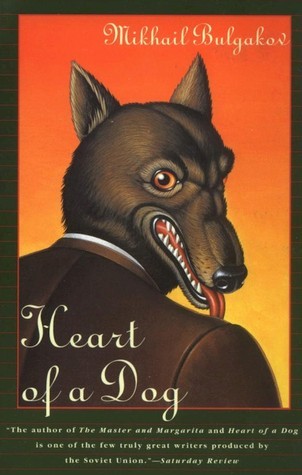Newly released
This book is new and will be uploaded as soon as it becomes available to us and if we secure the necessary publishing rights.

Heart of a Dog Book PDF
(0)
Author:
Mikhail BulgakovNumber Of Reads:
72
Language:
English
Category:
literatureSection:
Pages:
90
Quality:
excellent
Views:
893
Quate
Review
Save
Share
Book Description
Mikhail Bulgakov's Heart of a Dog, written in 1925, is a satirical masterpiece that humorously critiques the Russian Revolution and the socialist ideals of creating the 'New Soviet Man.' The story follows a surgeon who conducts a bizarre experiment by transplanting human body parts into a stray dog. Unexpectedly, the dog transforms into a crude, narcissistic, and ill-mannered human being. This new translation of Bulgakov's work is brought to life by the spirited reading of British actor Roy McMillan.
McMillan's narration captures the essence of the novel, using a dispassionate tone for the doctor's arrogance and a working-class (Cockney) accent for the dog. He skillfully voices the various characters, adding depth and personality to the story. While this satirical fantasy will likely resonate more with those familiar with Russian literature and the Soviet era, anyone who enjoys witty and fantastical tales will appreciate this title, especially when narrated by McMillan.
Through surreal and grotesque humor, Bulgakov cleverly reimagines the 'Frankenstein' parable, using the dog's transformation to satirize Soviet society. The story starts with the dog's unfortunate encounter with boiling water, leaving it on the verge of death during a harsh winter night. Unexpectedly, a wealthy professor takes pity on the dog and brings it into his home. However, the professor has ulterior motives, being an expert in medical experimentation. He performs a strange operation on the dog, implanting glands from a deceased criminal into its body. The result is a monstrous being, part-man and part-beast, which surprisingly adapts well to the peculiarities of Soviet society.
Mikhail Bulgakov
Mikhail Avanisevts Bulgakov, a Russian novelist and playwright, was born on May 15, 1891, in Kyiv, and he passed away on March 10, 1940, in Moscow. Initially, Bulgakov worked as a doctor, but he is best known for his novel "The Master and Margarita," which was published posthumously, three decades after his death. He was born into the family of a professor at the Kyiv Religious Academy, and he spent his childhood and youth in Kyiv. This city would later serve as a significant setting in his novel "The White Guard," becoming an expression of his deep connection to family and homeland, as evident in his article "Kyiv-City" from 1923.
Bulgakov attended the medical faculty of Kyiv University in 1909 and graduated with distinction in 1916, earning a degree as a medical doctor. During the 1920s, he explored the theme of social upheaval and its impact on human nature through satirical essays, stories, and anecdotes. Works like "Satanic Show" (1924) and "Deadly Eggs" (1925) exemplify his unique satirical literary style, which both fascinated and alarmed his contemporaries.
"The Heart of a Dog" (1925) was another satirical novel by Bulgakov that reflected the same direction of his sharp wit. Despite admiration from some, others refused to publish these works due to their scathing critique of the era.
The turning point in Bulgakov's career came with the publication of his novel "The White Guard." In 1925, the novel's two parts were published in the magazine "Russia," and it later gained further acclaim when adapted into the play "Days of the Turbins" at the Moscow Art Theater MKHAT in 1926. The play's success with audiences, including the attention of Stalin himself, was met with harsh criticism from the authorities, who accused Bulgakov of anti-Soviet sentiments. This led to the play's temporary withdrawal from the theater program in 1929, though it was shown again in 1932.
Bulgakov's international fame, however, came with his novel "The Master and Margarita," an extraordinary work that encompassed the themes from his previous creations and the essence of Russian and world classical literature. While the novel gained immense recognition globally, it faced censorship in the Soviet Union and was only published there in an abridged edition in 1966, long after the author's passing. Bulgakov consciously crafted this novel as a culminating masterpiece, blending various motifs and literary influences, solidifying his status as a prominent figure in Russian literature.
Book Currently Unavailable
This book is currently unavailable for publication. We obtained it under a Creative Commons license, but the author or publisher has not granted permission to publish it.
Rate Now
5 Stars
4 Stars
3 Stars
2 Stars
1 Stars
Heart of a Dog Quotes
Top Rated
Latest
Quate
Be the first to leave a quote and earn 10 points
instead of 3
Comments
Be the first to leave a comment and earn 5 points
instead of 3